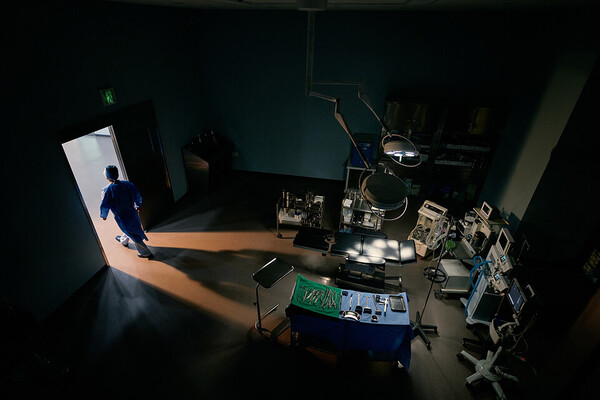The Yoon Suk Yeol administration's medical school enrollment quota increase and healthcare reforms do not help to strengthen essential and regional healthcare while paving the way for healthcare privatization, an expert said.
Therefore, the civil society should take the lead in enhancing the public nature of Korea’s healthcare system, the expert added.
Woo Suk-kyun, chairman of the Policy Advisory Council of the Association of Physicians for Humanism, harshly criticized the government’s healthcare reform in an article titled “Evaluation of the Yoon Suk Yeol administration's policy of increasing the number of medical school students and its alternatives” published in the latest issue of Economy and Society, a journal of the Critical Sociological Association of Korea.

Woo pointed out that after Covid-19, the shortage of doctors has emerged as an urgent issue due to the dearth of medical residents majoring in essential care as shown by the “emergency room pilgrimage” and “open and dash (at children’s hospitals).”
He noted that although the Yoon administration claimed to address regional and essential care problems through healthcare reform, it lacked the will to do so honestly and used them for political purposes.
Woo cited an example that while the government claims to address the disparity in regional medical care, it has failed to propose how to expand public medical institutions and regional medical centers. He added that it is impossible to strengthen regional and essential medical care without expanding public hospitals, especially in medically vulnerable areas, although regional medical centers meet the minimal medical demand to fill the vacuum caused by the lack of large private hospitals.
“The government's plan ignores the reality of the regional medical system,” Woo said. “It is a contradiction that the government vows to strengthen regional and essential medical care while implementing a policy that does not strengthen public medical care and even eliminates it.”
Woo said that the plan to increase the fee for essential medical care is not a policy to increase the number of doctors but to increase the burden of medical bills on patients. He noted that previous fee hikes have only increased the profits of private hospitals, and hospitals have not used the increased profits to invest in essential medical care or hire more doctors.
“The market-oriented methods of increasing market prices cannot solve problems resulting from market failure,” Woo said. “It will only have the side effect of increasing the burden of medical bills on patients.”
Woo emphasized that the government's plan to promote specialty hospitals is also nothing more than a “policy to strengthen for-profit hospitals similar to network hospitals” that ignores the reality of specialty hospitals.
Woo claimed specialty hospitals are similar to for-profit hospitals in foreign countries that do not operate unprofitable facilities, such as emergency rooms and intensive care units. Due to this characteristic, he said, the for-profit hospitals “drove out” neighboring general hospitals that were less profitable. He added that most specialty hospitals are in large cities, where unreimbursed treatment is standard.
Woo said an increase in heart and cerebrovascular hospitals, which the Yoon government cited as an example of “essential hospitals,” is also problematic.
“The U.S. also has cardiac specialty hospitals, but, in most cases, they are run by general hospitals as subsidiary for-profit hospitals for cardiology,” Woo said. “The U.S. General Accounting Office pointed out in a 1993 report that for-profit centers affiliated with nonprofit hospitals worsen healthcare access and cause unnecessary overtreatment.”
“In reality, specialty hospitals are more like networked for-profit hospitals,” he said. “The government policy that rewards these hospitals with higher reimbursement rates is not regional healthcare policy or healthcare reform.”
He also said that increasing the number of medical students to replenish the medical workforce cannot solve the “collapse of regional and essential healthcare.”
Notably, there are no measures to ensure that those assigned to rural medical schools remain in the region. He pointed out that there is no guarantee that students who graduate from non-metropolitan medical schools will work in non-metropolitan areas.
Therefore, a policy should be implemented to recruit more people to work in rural areas. Most importantly, he said, the number of regional public healthcare organizations should be increased to accommodate them.
“The policy of increasing the number of medical students is based on the presumption of the market principle that ‘if there are more doctors, some of them will go to provincial hospitals or non-popular departments,’ which is difficult to succeed on its own,” Woo said.
“It's easy to develop policies to direct the increased number of doctors to work in public and provincial hospitals under, for instance, the Public Medical School Act, which requires medical students to work in public and rural hospitals for 10 years,” he said. “To do so, however, the number of public hospitals where they can work must be doubled or tripled.”
Woo said civil society must stop the Yoon government's healthcare reforms and change the healthcare system to one centered on public healthcare.
“The Yoon administration plans and implements healthcare privatization policies in the name of healthcare reform,” Woo said. “We, the people, should take action to stop it. We must change the market-oriented Korean healthcare system, the root problem of medical bankruptcy, to a more public, equal, and democratic healthcare system.”
Related articles
- Doctors virtually left medical reform panel contrary to government’s wish to keep it
- Medical professors demand removal of 'rebellion chieftain' and reversal of medical student expansion plan
- 10 tertiary hospitals to cut 1,098 beds through government-aided restructuring
- Healthcare reform backlash: doctors slam plans as profit-driven, anti-patient
- Government to ban mixed treatment of reimbursed and unreimbursed care, sparking medical opposition
- New KMA leader calls for ‘halting all medical policies pushed by Yoon’
- Tired of prolonged conflict, 45% of Koreans call for revising or delaying healthcare reform: survey
- Will Yoon's investigation uncover the true reason behind the 2025 medical school admissions increase?
- [Desk Column] At this rate, Korean healthcare is really going to be ruined

